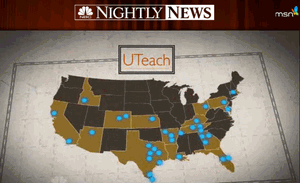|
|
|
|
|
|
|
News & Views item - March 2013 |
![]() HHMI Gives $22.5 Million to the National Teaching Training Network, Chaired by
Tom Luce. (March 19, 2013)
HHMI Gives $22.5 Million to the National Teaching Training Network, Chaired by
Tom Luce. (March 19, 2013)
On March 15, 2013 Tom Luce Chairman of NMSI, the US' National Math and Science Initiative, fronted the President's Council of Advisors for Science and Technology (PCAST) and spoke brilliantly on the work begun in 2007 in regard to NMSI's approach to training U.S. math and science teachers.
Today the Howard Hughes Medical Institute (HHMI) announced that it is giving US$22.5 million to expand the network of universities that have adopted the same approach to training U.S. math and science teachers funded by NMSI -- the UTeach program. To date 35 US universities including the University of California, Berkeley are engaged in the program.

This past Friday in Washington DC, Mr Luce told PCAST that the majority of graduate deans focus on preparing future Nobel Prize winners: "I realize that is important, but they also need to train the next generation of K-12 science teachers."
NMSI really gained momentum when the ExxonMobil Foundation pledged US$125 million on the provisor of NMSI obtaining matched funds.
Science's Jeffrey Mervis reports:
One hallmark of the UTeach program is that students graduate with a science degree as well as a teaching certificate, giving them both mastery of the subject and the pedagogical skills to do well in the classroom. Universities in the NMSI network are now training 6200 students and to date have produced 1150 teachers. UTeach officials at the University of Texas, which is the largest program, say that more than 90% of their graduates go directly into teaching and that 80% are still in the profession after 5 years.
HHMI's US$22.5 million will be used as the basis to invite research-intensive universities to compete for funding to set up 10 additional UTeach systems
Sean Carroll, vice president for science education at HHMI says:
The fact that [UTeach] works, and has been up and running for some time, gives us confidence that it's an effective model. It's a departure from our usual pattern of grantsmaking in the sense that it's more targeted. We're taking a chunk of our limited resources to expand something underwritten and proven by others. But we think that there is definitely a need. We would have liked to invest more, and we hope that others will join us.